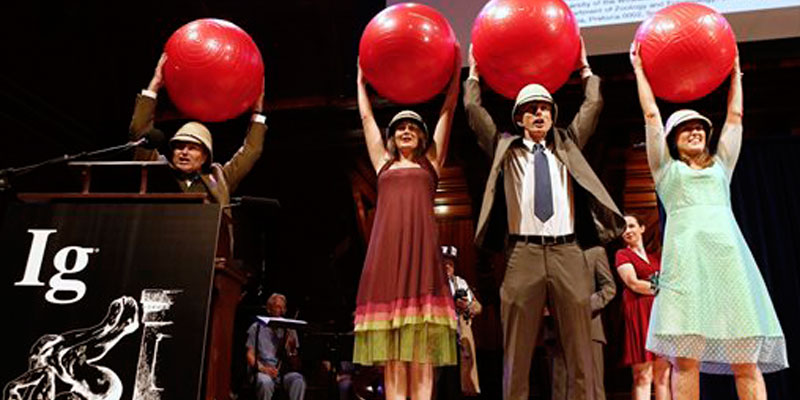
Left to right, Eric Warrant, of Sweden, Emily Baird, of Sweden, Marcus Byrne, of South Africa, and Marie Dacke of Sweden, celebrate winning the Biology/Astronomy Prize during the annual Ig Nobel prize ceremony at Harvard University Thursday, Sept. 12, 2013. They won for discovering that when dung beetles get lost they can navigate their way home by looking at the Milky Way. AP
CAMBRIDGE, Massachusetts — An experiment that proved people who think they are drunk also think they are attractive and another that showed lost dung beetles can use the Milky Way to find their way home were among the winners at this year’s Ig Nobel awards ceremony held Thursday.
This is the 23rd year for the award, sponsored by the science humor magazine Annals of Improbable Research and given out to honor weird and humorous scientific discoveries. The winners come from all over the world.
Actual Nobel laureates announced the winners during a ceremony at Harvard University.
Editor Marc Abrahams, who organized the ceremony, said the point is to make people laugh and then think.
For the first time, the winners received cash prizes — $10 trillion, but in Zimbabwe dollars. So they’ll each get about four U.S. dollars.
The awards ceremonies are usually silly, and this year’s was no different. It included a mini-opera and a contest to win a date with a Nobel laureate.
The winners will give short speeches Saturday at MIT.
The psychology prize went to the experiment that found people who think they are drunk also think they are attractive, done by Laurent Bègue, Oulmann Zerhouni, Baptiste Subra and Medhi Ourabah of France and Brad Bushman, a professor at Ohio State University who also teaches in the Netherlands.
The dung beetle navigation experiment won the joint prize in biology and astronomy, given to Marie Dacke, Emily Baird, Marcus Byrne, Clarke Scholtz and Eric Warrant, who work in Sweden, Australia, South Africa, the United Kingdom and Germany.
Other winners included Brian Crandall of the U.S. and Peter Stahl of Canada and the U.S., who parboiled a dead shrew, then swallowed it without chewing so they could examine their excrement to see which bones would dissolve in the human digestive system and which would not.